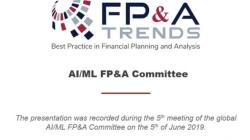During 2019 I have contributed articles to FP&A Trends that have addressed financial planning. The articles have addressed financial planning


Decision making requires a formal process to ensure that sound bases are taken into consideration and to ensure accountability and
At the fifth Committee meeting, Kevin McConnell, Intelligent Technologies Solution Strategy at SAP, shared an interesting presentation about using Machine

This article focuses on how to ensure that your team adopts business partnering because long-term it is not feasible to

Businesses exist in order to improve the well-being of others. One approach businesses use for achieving this goal is the

Among FP&A challenges understanding, explaining and forecasting revenues evolutions are one of the top items. It may be more or
Pagination
Subscribe to
FP&A Trends Digest

We will regularly update you on the latest trends and developments in FP&A. Take the opportunity to have articles written by finance thought leaders delivered directly to your inbox; watch compelling webinars; connect with like-minded professionals; and become a part of our global community.







